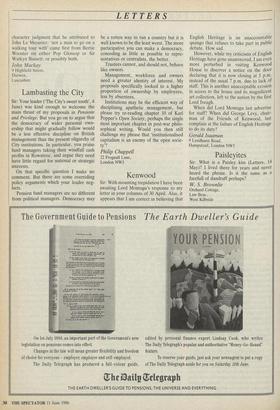Lambasting the City
Sir: Your leader (`The City's sweet tooth', 4 June) was kind enough to welcome the main thrust of my proposals in Pensions and Privilege. But you go on to argue that the democracy of wider personal own- ership that might gradually follow would be a less effective discipline on British management than the present oligarchy of City institutions. In particular, you praise fund managers taking their windfall cash profits in Rowntree, and argue they need have little regard for national or strategic interests.
On that specific question I make no comment. But there are some overriding policy arguments which your leader neg- lects.
Pension fund managers are no different from political managers. Democracy may be a rotten way to run a country but it is well known to be the least worst. The more participative you can make a democracy, conceding as little as possible to repre- sentatives or centralists, the better.
Trustees cannot, and should not, behave like owners.
Management, workforce and owners need a greater identity of interest. My proposals specifically looked to a higher proportion of ownership by employees, less by absentees.
Institutions may be the efficient way of disciplining apathetic management, but please try re-reading chapter 10 of Karl Popper's Open Society, perhaps the single most important chapter in post-war philo- sophical writing. Would you then still challenge my phrase that 'institutionalised capitalism is an enemy of the open socie- ty'?
Philip Chappell
22 Frognall Lane, London NW3


































































 Previous page
Previous page